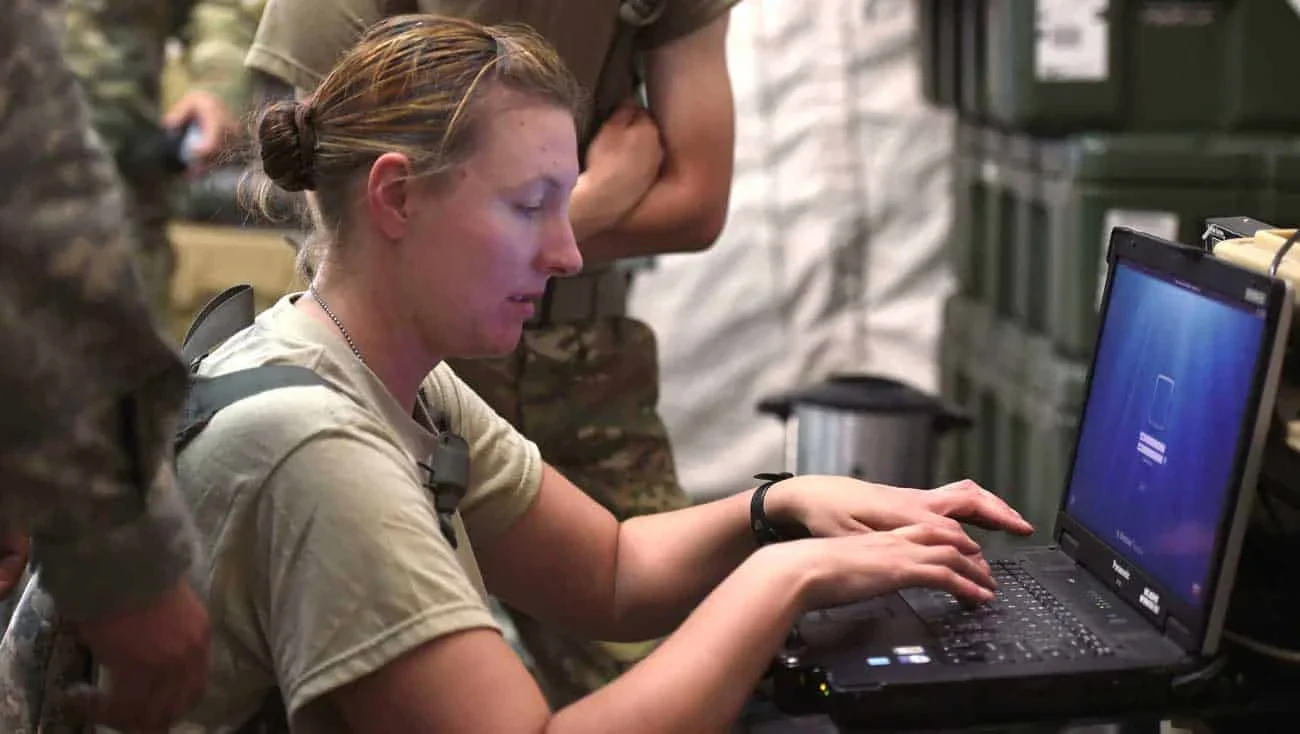
Basic Combat Training (BCT) stands as the crucible through which Soldiers are forged and shaped into disciplined individuals, ready to stand tall and serve their country. Within the ranks of the Your State Army National Guard (YSARNG), this transformative journey begins with an honest commitment to prepare yourself for the vigorous training that lies ahead. Once you get there, you may want to quit. You may want to give up. That’s a sure-fire sign you are pushing yourself beyond your limits. That kind of growth is the centerpiece of an extraordinary life. And the best part is that you won’t be going through it alone. You will have your fellow brothers and sisters with the same commitment, putting themselves on the line right alongside you. Your identity is going to shift. You are no longer going to operate as a single Soldier, but as a team accomplishing the same mission –to defend our nation with honor and respect. New recruits entering the YSARNG start with the Recruit Sustainment Program (RSP). Led by experienced recruiters and leaders, the program gives you a taste of military life. From learning how to wear the uniform to understanding military rules and rank structure, RSP gets you ready for the challenges ahead. Recruits often praise RSP for easing their worries and getting them mentally and physically prepared for Basic Training. By boosting confidence and teaching military basics, RSP will help you face your future with confidence and strength, making it easier to adjust to military life.
During Basic Training, you will be challenged in ways you never thought possible. You will push your body and mind to their limits, and you will emerge stronger, both physically and mentally. But beyond the physical rigors, you will also learn the true meaning of teamwork and camaraderie. You will rely on your fellow trainees, and they will rely on you, forging bonds that will last a lifetime. Here, your integrity will be tried and tested, so you emerge an upstanding citizen. You will be called upon to make difficult decisions, to uphold the highest moral standards, even in the face of adversity. But there’s no doubt, your confidence will increase as you rise to the occasion, demonstrating the unwavering character that defines our military. Here is an outline of what to expect at Basic Training:
Staying in shape is a big part of Basic Training. But know this: every drop of sweat shed, every mile run, every push-up completed is not just a physical exercise—it’s a testament to your determination, your grit, and your unwavering commitment. You’ll have at least three hours’ worth of daily workouts to keep you sharp and energized. Each session includes a comprehensive warm-up and cool-down routine to minimize the risk of injury and keep you primed for peak performance. Through the rigors of Basic Training, you will foster friendships as a crucial strategy for building mental resilience. These friendships, if you so choose, will last a lifetime. There’s nothing stronger than the bond between those who choose to walk alongside each other when times get hard, to set out and accomplish a common goal. And while the days may be long and challenging, the camaraderie forged among trainees will be the support you need in the coming days ahead.
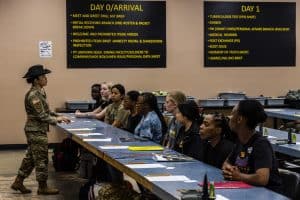
As Basic Combat Training approaches, you must begin your physical preparation. We encourage you to start your days at 6 a.m. a month prior to departure and jump right into cardio workouts to build endurance. Many of the disciplinary exercises you will do in BCT target the shoulder muscles. Keep that in mind as you build your workout routine. As you pack your bags, bring with you $50 in cash, a positive attitude, and essentials like clothes and toiletries. Please leave behind things like tobacco, open toed shoes, and weapons. Feeling nervous? That’s a good thing. It means you care. Use that energy as motivation to push yourself. Approach this new journey with excitement, knowing each challenge is a chance to grow.
Life at Basic Training follows a strict schedule:
Fire Guard: A tradition that stems back to the days of wooden barracks. Two trainees will be on guard throughout the night, ensuring that everyone’s weapons remain secured and that everyone is safe. Fire guard shifts are one hour, so you wake up, stand guard for an hour, wake up the next shift, then go back to sleep.
Drill Sergeants are the heart of Basic Training, guiding you through the tough times and turning you into a true Soldier. They live with you and train with you, to the highest degree. Drill Sergeants set immaculate standards and expect quick, respectful responses. Everything you do, in BCT, will be the direct result of completing specific instructions set by your Drill Sergeant. As a trainee, you will respond promptly with a crisp “Yes, Drill Sergeant” or “No, Drill Sergeant,” adhering to commands without hesitation. Immediate obedience to your commanding officers maintains discipline, unity, and operational effectiveness. Their duty is to uphold and protect the team. Your trust and obedience are crucial, as they can mean the difference between life and death, or a mission being a success or failure.
“It is very easy to do the right thing. Try your best at everything you do, and don’t let your emotions control you.” –PVT Joseph Heim, Oakes, ND
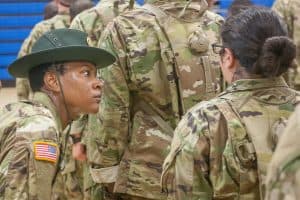
Once you have completed your Basic Training, graduation is a celebration unlike any other. All of your hard work has paid off and you officially become what you set out to accomplish in the first place. The conclusion of your final Field Training Exercise marks a pivotal moment: the rite of passage ceremony. Here, amidst a backdrop of camaraderie and accomplishment, you officially earn the esteemed title of Soldier. This ceremony, while preceding graduation, is no less significant, serving as a poignant testament to your dedication and resilience. Anticipation builds as you prepare to mark the culmination of your BCT journey at the graduation ceremony. You will have plenty of time to send the details to your friends and family so they can share in this momentous occasion. The ceremony itself is a grand affair, featuring displays of drill and ceremony, platoon introductions, and speeches honoring your achievements. Additionally, Family Day, held the day before graduation, offers your loved ones a glimpse into the environment where you’ve lived and trained for the past ten weeks, fostering a deeper understanding of your experiences.
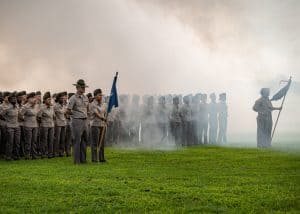
With Basic Training behind you and the title of Soldier proudly earned, the journey continues with Advanced Individual Training (AIT). Following graduation, you will fly to the installation designated for your AIT, where you undergo specialized training tailored to your Military Occupational Specialty (MOS). AIT durations vary, spanning anywhere from 4 to 30 weeks, affording you greater freedoms and opportunities for personal and professional development. As you embark on this next phase of your military journey, seize every opportunity for growth and mastery, knowing that each step brings you closer to fulfilling your greatest potential as a Soldier.
As you prepare to undergo your journey through Basic Training, take some time to reflect on the insights and wisdom shared by recent graduates like PVT Joseph Heim from Oakes, ND. “I was trained to overcome adversity.” Heim recalls, “I also learned that everyone has a reason for joining, and that not everyone is the same. Everyone deserves respect, as you do not know what they’ve been through.”
PVT Heim’s testimonial offer a glimpse into the transformative journey that awaits each Soldier. Your testimony will be unique and your story will have something new and valuable to offer the generations who come after you – from the camaraderie forged amidst the challenges of training to the personal growth and resilience cultivated along the way. As you approach each day with determination and an open mind, know every challenge presents an opportunity for growth and self-discovery. With dedication and perseverance, you’ll emerge from Basic Training not only as a Soldier but as a stronger, more resilient person ready to face whatever lies ahead.
New Image Uploaded: Recruiting and Retention Campaign materials have been updated. Please review the latest visuals.
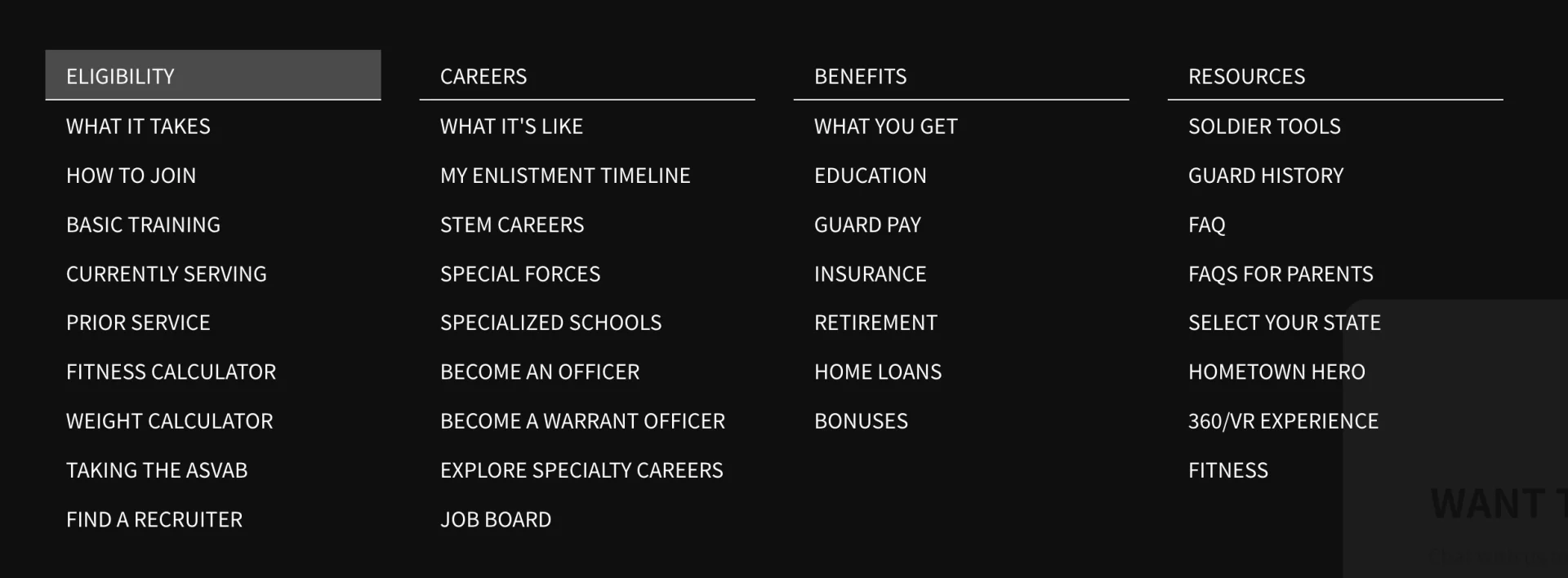
Quisque rutrum. Curabitur ligula sapien, tincidunt non, euismod vitae, posuere imperdiet, leo. Fusce vel dui. Integer tincidunt. Nam pretium turpis et arcu.
Lorem ipsum dolor sit amet, consectetur adipiscing elit. Ut elit tellus,